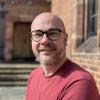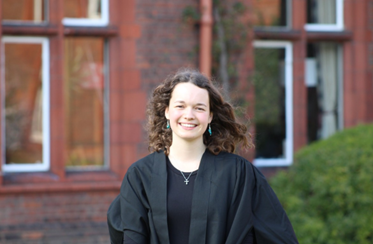
Dr Stuart Davis
Director of Studies, Fellow
At Girton, you get the best of both worlds: the scale of a large college and the warmth of a close-knit community. With the guidance of both the History and Modern Languages Fellows, students thrive in a supportive, intellectually stimulating environment: in the words of one of our students, Girton is ‘a safe place to be intellectually daring.’"
For more on History at Girton see here and for more on MML see here.
The joint degree in History and Modern Languages combines the best of both subjects. It offers the opportunity to develop near native-speaker skills in a foreign language while studying a range of papers relating to the culture and history of the relevant language area; options in some languages also include film, linguistics and contemporary politics. Students will also develop analytical skills in History through a wide range of topics in British, European, American and World history, as well as the history of political thought. There will be opportunities to work with historical sources in foreign languages. Like other language students, those who take this course will spend their third year studying or working abroad, thereby immersing themselves in the language, culture, history and politics of a foreign country.
The languages available for study post-A level (or equivalent) are: French, German, Italian, Russian or Spanish. Languages available to study ab initio (from scratch) are German, Italian, Portuguese, Russian or Spanish.
Both faculties are regarded worldwide as leaders in their respective fields. The History Faculty is one of the largest in the United Kingdom and is consistently ranked as the best in research and teaching assessments. It has internationally recognised experts in all relevant fields of study. The Modern Languages Faculty is the largest in the United Kingdom and is also consistently rated as one of the best. It offers an unrivalled range of courses taught by leading scholars. The library resources in Cambridge, which support teaching and research in both Faculties, are world-class. The University also has extensive collections of films in all relevant languages, with Girton one of the few college libraries to stock loanable DVDs.
Alongside the History Fellows, Girton has a dynamic and supportive team of teaching Fellows in Modern Languages, specialising in Spanish, French and Italian. For these languages, supervisions (small group teaching sessions) usually will take place in college. Each year, we also welcome a French lecteur/lectrice from the École Normale Supérieure in Lyon who offers French-language teaching to our students. For those languages we do not cover in-house, we have longstanding links with excellent supervisors in other Colleges.
Students will also meet regularly with their Director of Studies (DoS). The DoS is the principal academic contact for students in College for MMLL; HML students have both a History and MMLL DoS. They support students to reach their full potential, and offer guidance on future plans, whether those be for their Year Abroad or for the potential papers (‘modules’) they might choose.
Girton is a place where we go the extra mile to ensure that everyone can fulfil their academic potential. All the historians at the College meet together regularly for informal ‘current research’ sessions and social occasions, like dinners in Hall and the summer historians’ garden party. Language students enjoy a start-the-year party to welcome new students and those returning from their study abroad, as well as informal seminars on cultural and literary theory, designed to support their work in Tripos papers. Girton also has an active History Society that has organised talks by such prominent local figures as Professor Richard Evans, Professor Orlando Figes, Professor Quentin Skinner, and Professor Tim Blanning. Virginia Woolf’s essay ‘A Room of One’s Own’ was originally delivered to the Girton History Society (known back then as the ‘One damn thing after another’ Society).
 HML is very engaging – the variety makes it super intellectually stimulating, which has made the workload feel more manageable! Although initially I thought it would be a bit of a mission keeping up with both subjects, I think the skills learned actually complement each other and are transferable [...]. When picking a college, I think the most important thing for me is definitely the atmosphere, because that’s the environment you have to live in for the next 4 years! Girton is a really close, friendly and accepting community, despite being quite a big college. There is so much support; even through my first year I’ve had senior members of the college taking a personal interest in my well-being. You are encouraged to fully embrace college life through music, art, sport, or anything else. [...] This support is very special; you really are encouraged to reach your full potential both academically and personally.
HML is very engaging – the variety makes it super intellectually stimulating, which has made the workload feel more manageable! Although initially I thought it would be a bit of a mission keeping up with both subjects, I think the skills learned actually complement each other and are transferable [...]. When picking a college, I think the most important thing for me is definitely the atmosphere, because that’s the environment you have to live in for the next 4 years! Girton is a really close, friendly and accepting community, despite being quite a big college. There is so much support; even through my first year I’ve had senior members of the college taking a personal interest in my well-being. You are encouraged to fully embrace college life through music, art, sport, or anything else. [...] This support is very special; you really are encouraged to reach your full potential both academically and personally.
I have found that by studying both [History and MML], I have been able to engage different parts of my brain and hone a wider variety of skills than a single subject degree would allow! HML [...] has more teacher contact than many other subjects which is another huge benefit! [...] I decided on Girton because it felt very unstuffy and welcoming [...] (you can walk on all the grass here, somewhat of a Cambridge rarity!). The college also provides great facilities – for example the kitchens are far better than many other colleges and I wanted to cook for myself. The on-site sports facilities, pool and easy access to nature were what sealed my choice!